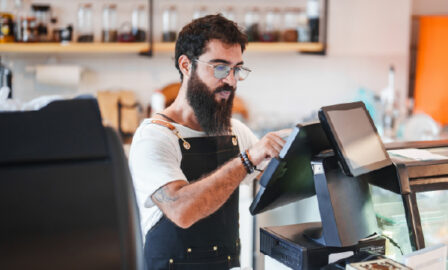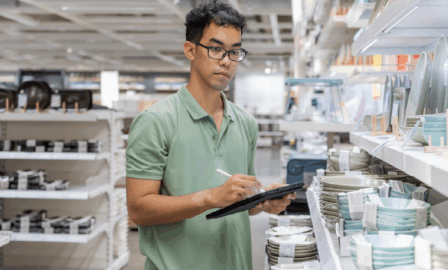How Technology is Enhancing the Customer Experience in Retail Hospitality
In the time of travel, globalization, and digitalization, retail hospitality plays a significant role in customer preferences and experiences. Retail hospitality is the shopping, dining, and services offered in non-traditional locations like airports or hotels. With the chaos that can be involved with travel and the unfamiliarity, guests are expecting their retail experiences to be the easy part. In this piece, we explore how technology is enhancing the customer experience in retail hospitality.
The Evolving Role of Technology in Retail Hospitality
Technology, such as artificial intelligence (AI), is evolving to meet guests’ retail expectations with personalized features and a seamless shopping experience – in hospitality retail locations like restaurants, hotels, casinos, and gift shops. In fact, 97% of airlines are actively planning the implementation and use of AI-generated programs to enhance their customers’ experiences according to a 2024 report.
Hospitality retailers, such as hotel gift shops and airport restaurants, need to consider the diverse needs of their guests and implement innovative solutions on how to meet them. Through leveraging some of the of the technologies below, hospitality retailers can revolutionize the guest experience through personalization and meeting evolving consumer expectations.
Serving Customer Preferences Through Technology
Hospitality retailers provide a unique retail experience, as the customers coming in aren’t often the typical everyday shoppers that retailers may expect. For example, local grocery stores may expect the neighborhood regulars to purchase their kids’ school lunch items for the week. However, hospitality retailers have a much different customer base, as shoppers are likely from out of town or stopping in on their vacation. This makes leveraging technology to personalize the customer experience even more important, as guests may be confused or unfamiliar with the area and need additional guidance.
To address this, we’re seeing some hospitality retailers leveraging chatbots equipped with AI generated answers to make customers feel more knowledgeable and comfortable. For example, before AI, Hyatt Hotels used Facebook messenger for some of their guests’ questions; however, they have now developed a chatbot to facilitate this process and answer the questions of guests. Also, considering that questions may come through in various languages or in differing time zones, AI can help bridge the language gap and help guests feel more comfortable through providing customers with the answers or personalized experiences they’re looking for in a convenient manner.
Eliminating Friction with Elevated POS systems
Oftentimes, hospitality retailers are one-stop shops for customers looking for convenience and simplicity. Customers may be in a rush for a business meeting or forgot a certain item for their vacation. In order to quickly meet customer needs, hospitality retailers can rely on mobile apps that enable their guests to order their items in a fast and simple way – and establish your business as a source that customers can rely on.
Eliminating friction through using a smart phone app or implementing a digital POS system is an effortless way to cut out hassle and keep customers coming back all vacation. Additionally, offering guests a way to request items through an app or in-room tablet is technology hotels are utilizing to keep processes digital and simple. Booking a reservation, having a cocktail, or even getting your nails done, can all be done and paid for through one application, cutting out friction for not only the customer but throughout the entire organization.
Predictive Analysis for Cost-Effectiveness and Sustainability
Despite these shops not being your typical brick-and-mortar retail shops, customers value consistency, especially when not in their typical environment. Looking through past historical data with AI, hospitality retailers can generate a better estimate of customer demand. For example, the bar being out of orange juice during breakfast time may be a major setback for a hotel or airport restaurant. Or, on the other hand, having too many bagels during dinner time isn’t very cost-efficient.
Leveraging AI to help predict customer demand and determine how to use your resources most efficiently for inventory planning is key. Many organizations are already taking advantage of predictive analytics; in fact, hotel management expects predictive AI to be over 40% of their total AI investments in the coming year. This is not only cost-effective for the business, but good for sustainability purposes for the community. AI familiarizes itself with habits of the customer using historical and current data, and then suggests buying and usage patterns so that the owner can make sure their food isn’t going to be wasted. This technology isn’t only beneficial to business owners, but it is also meeting the growing customer demand for sustainability.
Enhancing the Customer Experience in Retail Hospitality
Retail hospitality can be a difficult industry to navigate, as there’s a high degree of uncertainty involved with non-traditional locations and store structures. Learning the wants of your customer base and investing in the right technology to meet their needs will help facilitate the workings of your organization. If your business is curious about learning more about new retail hospitality technology, reach out to team today.
Subscribe to Clarkston's Insights
Contributions from Leah Harding



